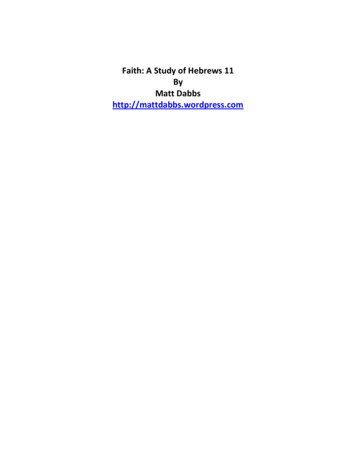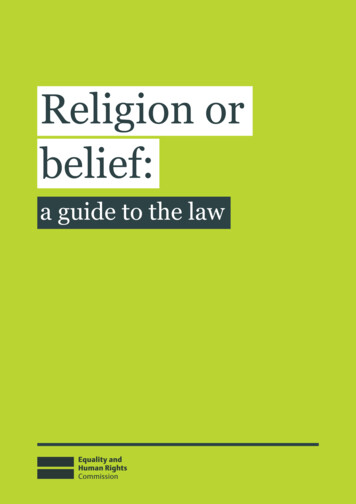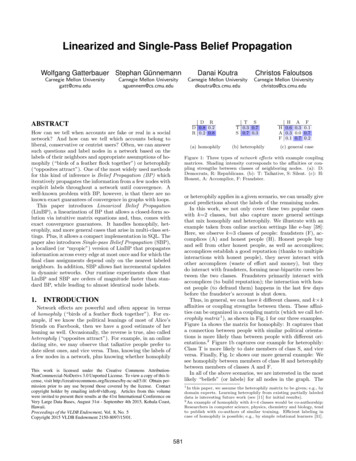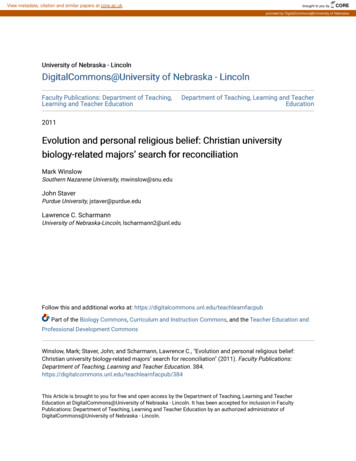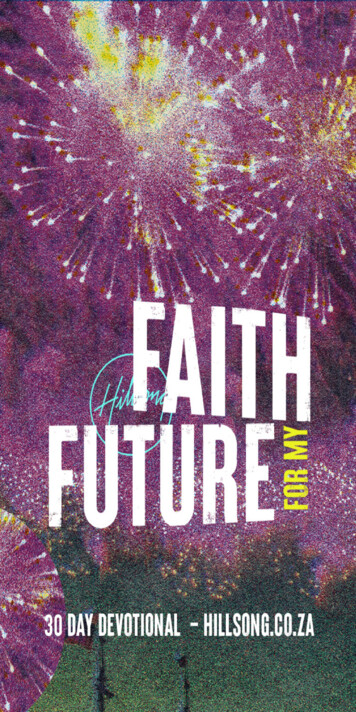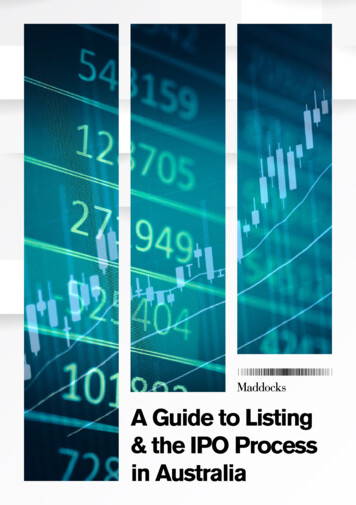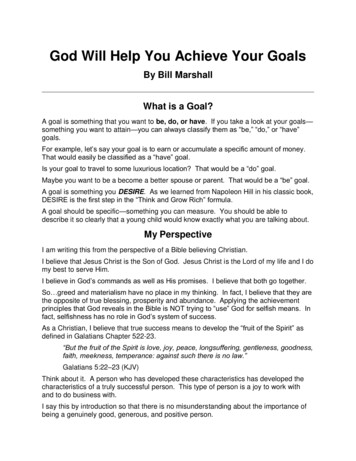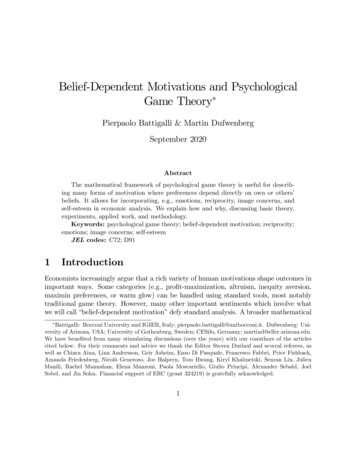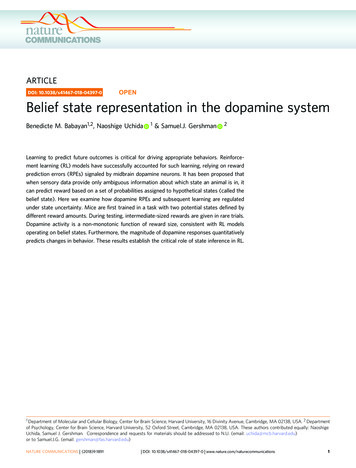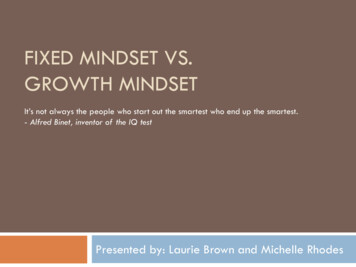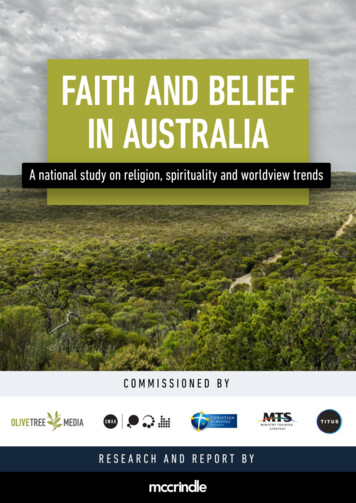
Transcription
Faith and Belief in Australia
Faith and Belief in AustraliaA McCrindle PublicationPublished byMcCrindle Research Pty LtdSuite 105, 29 Solent CircuitBaulkham Hills, NSW, 2153AUSTRALIAwww.mccrindle.com.au info@mccrindle.com.au 612 8824 3422 McCrindle Research Pty Ltd May 2017This publication is copyright. Fair dealing for the purpose of private study, research, criticism or reviewis permitted under the Copyright Act. In addition the Publisher grants permission to use images andcontent from this report for commerical and non-commercial purposes provided; 1. Proper attibution isgiven such as ‘Faith and Belief in Australia’ by Mark McCrindle, used by permission McCrindleResearch’ and 2. Notification of the use is provided to the Publisher.Cataloguing-in-Publication entry Author: McCrindle, MarkTitle: Faith and Belief in AustraliaISBN: ISBN – 978 0 9924839 2 0Subjects: Religion – Australia.Spirituality – Australia.Christianity – Australia.Other Authors/Contributors: Renton, Sophie; Phillips, Annie; Miles, Eliane.2
Faith and Belief in AustraliaContentsResearch objectives4Research methodology4Faith and belief in Australia defined7Executive summary9Religion in Australia11Spirituality in Australia21Discussing spirituality and religion24Christianity29Christians34The Church36The local church39Jesus42Demographics473
Faith and Belief in AustraliaResearch objectivesCommissioned by Olive Tree Media, Christian Media and Arts Australia*, Christian Schools Australia,Ministry Training Strategy, and the Titus Foundation, the 2017 Faith and Belief in Australia studyexplores the state of Christianity in Australia. The purpose of this research is to investigate faith andbelief blockers among Australians and to understand perceptions, opinions, and attitudes towardsJesus, the Church and Christianity.*Christian Media and Arts Australia represents 1079 Life FM - Adelaide, Hope1032 - Sydney, 89.9 LightFM - Melbourne, 96fiveFamily Radio - Brisbane, 98five Sonshine FM - Perth, Juice1073 - Gold Coast, ultra106.5 fm - Hobart, 99.7 Rhema FM - Newcastleand 96three - Geelong.Research methodologyThis research employed qualitative and quantitative methods to explore Australian perceptions andattitudes towards Christianity, the Church, and Jesus. These methods included a nationallyrepresentative survey of Australians, a series of focus groups with individuals who do not identify asChristians and analysis of data from the Australian Bureau of Statistics.National survey of 1,024 AustraliansThis survey was developed and deployed to an online panel and completed by 1,024 Australians, whowere representative of the national population by gender, age, and state. The survey was conductedfrom 13th January to 18th January, 2017.Focus groups with 26 non-ChristiansThree focus groups were conducted to explore the attitudes and experiences of Australians who donot identify as Christians. The purpose of the groups was to understand their perspectives,experiences, and attitudes towards religion and spirituality.The groups were held in Sydney from 15th March to 16th March, 2017. The 26 participants weresegmented by age cohorts with one group for each of the following generations:4GenerationFemale participantsMale participantsTotal participantsGen Y (aged 23-37)448Gen X (aged 38-52)459Baby Boomers (aged 53-71)549
Faith and Belief in AustraliaThroughout this reportReference to the generations throughout this report refer to the following age categories: Generation Z: 7-22 year olds (those born from 1995 to 2009)Generation Y: 23-37 year olds (those born from 1980-1994)Generation X: 38-52 year olds (those born from 1965-1979)Baby Boomers: 53-71 year olds (those born from 1946-1964)Builders: 72 year olds (those born from 1925- 1945)Focus group participants will be referred to as ‘non-Christian participants’ throughout the report.Terminology and s egmentation throughout this reportA series of segments are used throughout this report to differentiate participants based on theirworldviews.Q. What religion do you currently practice or identify with?Segment nameOption/s chosen% of AustralianpopulationAustralians who identify withChristianityChristianity (Catholic/Orthodox), %Non-religiousNone, I do not identify with any religion orspiritual belief32%Spiritual but not religiousI have spiritual beliefs but I don’t identify withany main religion14%Non-ChristiansNon-religious, Spiritual but not religious, ‘other’,Buddhism, Hinduism, Islam, Judaism55%Q. Which of the following best describes your current attitudes towards Christianity?Option/s chosen% of AustralianpopulationNon-Christians warm toChristianity‘I believe in Christianity, but don’t considermyself a Christian’, ‘I believe in much ofChristianity, but still have some significantdoubts’ and ‘I believe in the ethics and values ofChristianity but I don’t practice Christianity in anyway’15%Non-Christians cold toChristianity‘I am passionately opposed to Christianity’, ‘I’vegot strong reservations about Christianity and Ihave no interest in it’ and ‘I have some issueswith Christianity and it isn’t for me’25%Segment nameQ. Given the right circumstance and evidence, how open would you be to changing yourcurrent religious view?5
Faith and Belief in AustraliaSegment nameOption/s chosen‘Extremely open’, ‘Significantly open’,Non-Christians open tochange‘Somewhat open’ and ‘Slightly open’% of Australianpopulation26%Q. How frequently do you attend church?Segment nameOption/s chosen% of AustralianpopulationAustralians who identify withChristianity who regularlyattend church‘Weekly’. ‘Fortnightly’ and ‘Monthly’15%Australians who identify withChristianity who neverattend church‘Less than annually’ and ‘I do not attend achurch’22%6
Faith and Belief in AustraliaFaith and belief in Australia definedThe Australian Bureau of Statistics Censusfor ‘spiritual but not religious’. This had aquestion on ‘religion’ asks Australians to identifyresponse rate of 14% among Australianstheir religion through the question, ‘What is yournationally, and the Christianity grouping wasreligion?’ The 2011 Census results showed that45% (down from 61% in the 2011 Census). When61% of Australians identified with Christianity. Agrouping the ‘spiritual but not religious’further 22% stated they had ‘no religion’, 9%respondents with those identifying withremained ‘undefined’ and 8% indicated theyChristianity (45%), this total figure is similar toadhered to other religions.the Census (59% compared to 61%).Total Christianity and the ‘spiritual butWhat do the ‘spiritual but not religious’not religious’believe?One of the purposes of this Faith and Belief inThose who are spiritual but not religious areAustralia study is to add greater delineation andmost likely to believe there is an ultimateunderstanding to the 2011 Census ‘Totalpurpose and meaning in life (36%). One in fourChristianity’ numbers. The Census does not(26%) believe in the inward journey ofcollect data on spiritual belief, and those whodiscovering the inner person. One in five (22%)would opt for a ‘spiritual but not religious’ optionbelieve in a mixture of spiritual beliefs fromgenerally select one of the ‘Christian’major religions.denominations.Church-goersWhile we replicated the Census approach, toA third of Australians who identify withgain more meaningful data, the question weChristianity attend church at least once a monthasked tightened the identifying critera, from(15%). The active practisers ‘extremely involved’“What is the person’s religion?” (Census) toin practicing their religion and worshipping as“What religion do you currently practise orpart of a group are rarer still, comprising 7% ofidentify with?” Additionally, we added an optionthe national population.7
Faith and Belief in Australia‘No religion’ and those ‘not defined’response, but more accurately represents the(Census)total ‘no religion’ worldview of Australians.The ‘no religion’ option captured in the 2011Census (22%) includes those who state or selectWhat do those with ‘no religion’‘no religion’.believe?Half of non-religious Australians (49%) say theirThe ‘not defined’ option (9%) largely capturesposition on religion is that they prefer athose who choose not to answer this voluntaryscientific and rational, ‘evidence-based’question (leave it blank). It also includes thoseapproach to life. One in five (18%) think religionwho answer the question with a response thatis a crutch for the weak to lean on, and a furthercannot be identified as a religion under theone in seven (14%) believe that religions andAustralian Standard Classification of Religiousspirituality are outdated and traditional.Groups. Well-publicised examples include ‘JediKnight’ and ‘Flying Spaghetti Monster’.Growth in ‘no religion’ over the pastcenturyA significant proportion of the 9% ‘not defined’There has been a notable increase in theCensus category are comprised of the ‘notproportion of Australians who identify with nostated’ (no response) answers. It can bereligion over the past 100 years, from 0.4% inassumed that many of these adhere to no1911 to 22% in 2011.religion. In this Faith and Belief study thereligion question was compulsory, and soyielded no ‘not stated’ responses. Therefore,this study’s total (32%) is higher than the CensusNote that in the 1971 Census the instructions, ‘if no religion,write none’ was introduced into the Census, explaining thesignificant rise in ‘no religion’. We expect a similar rise in ‘noreligion’ when the 2016 Census results are released, due toa methodology change that has placed ‘no religion’ as thefirst tick-box option in the latest Censu
Faith and Belief in AustraliaExecutive summaryReligion in Australia(65%). Baby Boomers, on the other hand, areReligion in Australia is not dead. This studythe most uncomfortable, with half (51%) nevershows that two thirds of Australians (68%)talking about religion or spirituality with friends.currently follow a religion or have spiritualbeliefs. The number of Australians who do notidentify with a religion or spiritual belief,however, is on the rise. Almost one in threeAustralians (32%) now do not identify with areligion.Household upbringing influences religiousidentity. Almost half of Australians who identifywith spirituality or religion in some way remaincommitted to the religion of their upbringing(47%).Australians may identify with religious beliefsbut are not always active in their religion. Justone in five Australians (20%, across all beliefs)are extremely or very active in practicing theirThe greatest attraction to investigatingspirituality and religion is observing peoplewho live out a genuine faith (61% are attractedby this). Second is experiencing a personaltrauma or significant life change (59%).The top repellent to investigating religion andspirituality is hearing from public figures andcelebrities who are examples of that faith(58% are repelled by this). This is followed bymiraculous stories of people being healed orsupernatural occurrences (52%).There are spaces in society that are perceivedto be more appropriate than others whentalking about spirituality and religion. The tworeligion or worshipping as part of a group.most inappropriate places are suggested to beMore than half of Australians (52%) are open,inappropriate by 23% of Australians) andto some extent, to changing their religiouscommunity events or groups (12%).shopping centres (deemed as veryviews given the right circumstances andevidence. Younger generations are more likelyChristianitythan older generations to be open to changingAustralians vary in their current attitudestheir current religious views (20% Gen Z, 19%towards Christianity. When asked whetherGen Y, 12% Gen X, 4% Baby Boomers, and 6%they themselves say that they are a ‘Christian’,Builders say they are extremely/significantlyalmost two in five (38%) ‘consider themselves aopen).Christian’ (compared to 45% who identify withConversations with people are the biggestprompt for Australians to think about spiritual orreligious things (31% concur).Discussing spirituality and religionMore than half of Australians (55%) talk aboutspirituality or religion (often or occasionally)when they gather with friends. Generation Z isthe most comfortable of all generations talking(often/occasionally) about spirituality or religionChristianity as a religion). A further 24% are‘warm’ towards Christianity with 12% neutraltowards it. The remaining 26% of Australians are‘cool’ (negative) towards Christianity.Parents and family have the greatest influenceon Australians’ perceptions and opinions ofChristians and Christianity (57% say they havemost influenced).
Faith and Belief in AustraliaThe biggest blocker to Australians engagingknow little or nothing at all about the Church inwith Christianity is the Church’s stance andAustralia (52% cf. Builders 34%).teaching on homosexuality (31% say thiscompletely blocks their interest). This isAustralians most value the Church andfollowed by, ‘How could a loving God allowChristian organisations for their work withpeople to go to hell?’ (28%).those in need. Australians highly value the workof the Church in looking after people who arePerceptions of Christians and Christianity arehomeless (74% extremely or somewhat valuenegatively influenced by the actions andthis), offering financial assistance/food reliefbehaviours of Christians in society.programs (72%) and providing disaster reliefPerceptions of church abuse are the greatest(69%).negative influence (73% say this ismassive/significant), followed by religious warsThe supportive community (38%) is what(65%). Two thirds (65%) say they are negativelyAustralians most value about the local church.influenced by hypocrisy.Social connections (24%) and the ability toworship together (21%) are also valued aspectsChristiansof the local church. Two in five (44%)Australians differ in their knowledge andAustralians, however, do not value anythingperceptions of Christians. Four in fiveabout the local church.Australians (79%) know two or more Christians.Nearly 1.5 million Australian adults, however, doJesusnot know any Christians at all (8%). For thoseOne in two Australians (53%) consider Jesus’ lifewho know at least one Christian, the top wordsto be extremely or very important in the historyused to describe Christians are:and culture of the world. Only one in three (31%),however, consider Jesus’ life to be extremely or1. Caring (41% select this word)2. Loving (35%)3. Kind (35%)The Churchvery important to them personally.Love is the attribute of Jesus that Australiansconnect with the most. The top three attributesof Jesus that Australians connect with in apositive way are:Just one in five Australians (22%) know a great1. Love (50% connect with this)deal or a lot about the Church in Australia. Six2. Hope (39%)in ten (60%) know a moderate amount or a little.3. Care (34%)Almost one in five (18%) know nothing at all.Generation Y are the most likely to suggest they10
Faith and Belief in AustraliaReligion in AustraliaReligion in Australia is not dead.Two thirds of Australians (68%) currently followA high proportion of Generation Y non-a religion or have spiritual beliefs. A largeChristian participants agree with thisproportion of the Australian population identifyperspective. In the focus groups they alsowith Christianity (45%). The number ofexpressed, however, that in the current climateAustralians not identifying with a religion orthere is potential for religious beliefs to grow.spiritual belief, however, is increasing. Almostone in three Australians (32%) now do not“I think that in times of political unrest identify with a religion, and 14% identify aspeople want peace. Any religion that willspiritual but not religious.provide that will grow.” (Gen Y)Insights into the growth of non-religiousLocation and gender differences in religiousAustralians. In response to the growingbeliefs. Religious and spiritual beliefs varynumber of non-religious Australians, a non-across gender, age and location. SouthChristian participant from the focus groupsAustralia has the highest proportion ofstated:respondents who identify as spiritual but notreligious (46%). This is consistent with the high“[People] not identifying with any religion orproportion of Australians who state they havespiritual belief will grow. People are‘no religion’ in the 2011 Census data (see table,searching, people are not believing whatTop 3 religions by state). Females are moretheir parents believe.” (Baby Boomer)likely than males to identify as spiritual but notreligious (18% cf. 10%). Males, however, areGeneration X believe that affluence has had anmore likely than females not to identify with aimpact on faith and belief in Australia.religion (36% cf. 29%).“In Australia, we are quite well off. We haveGenerational differences in religious beliefsgot a good life. People turn to religions whenReligious beliefs are more prevalent in thetimes are tough and I don’t think that theolder generations. Almost two in three Builderstimes are as tough anymore. People know(63%) identify with Christianity, but only one inmore about religion so they’re not sold onthree Generation Y (32%) do so.one story, they don’t think, ‘If I don’t pray andask for forgiveness, I’m going to go to hell.’Generation X is the generation most likely notPeople don’t buy the story anymore. Theyto identify with a religion (38%); slightly moreknow too much.” (Gen X)than Generation Y (36%) and Generation Z(34%).11
Faith and Belief in AustraliaTop 3 Religions by state: The rise of ‘no can(18.8%)Anglican(20.4%)Top 3 Religions by state: : The rise of ‘no ican(11.4%)Anglican(12.3%)* 2011 and 2006 Census data12
Faith and Belief in AustraliaQ. What religion do you currently practice or identify with?n 1,024 (all respondents)None - I do not identify with any religion or spiritualbelief32%Christianity (Catholic/Orthodox)25%Christianity (Protestant/Evangelical/Pentecostal)19%I have spiritual beliefs but I don't identify with any ther (please specify)0%2%Gen ZGen YGen ritual beliefs but don’t identifywith any main religion13%14%14%14%16%None I do not identify with any religionor spiritual belief34%36%38%28%18%Religious identification13
Faith and Belief in AustraliaNon-religious Australians prefer an evidence-based approach tolife.Insights into Australians who do not identify with any religion or spiritual belief – 32% of respondents,n 330.Almost one in two (49%) non-religiouslikely as females to believe that religion is aAustralians prefer a scientific and rational,crutch for the weak to lean on (22% cf. 13%).‘evidence-based’, approach to life. Almost onein five (18%) think religion is a crutch for theOne in seven non-religious Australians (14%)weak to lean on. Males are almost twice asbelieve that religions and spirituality areoutdated and traditional approaches to life.Q. Which of the following statement best describes yourposition and thoughts about religions?n 330 (those 'non-religious')I prefer a scientific and rational, 'evidence-based'approach to life49%I think that religion is a crutch for the weak to lean on18%I think that religions and spirituality are outdated andtraditional approaches to lifeThere is no spiritual realm, religions are foruneducated people14%5%I am considering a new religion or spirituality, but donot practice or identify with one presently2%I have been considering a new spiritual belief, butneed more information before I start to practice oridentify with these religions or spiritual beliefs2%I have just left a religion or spiritual belief and I am notplanning on finding a new religion2%I have just left a religion or spiritual belief and I am notquite ready to find a new religion0%Other (please specify)8%14
Faith and Belief in AustraliaHousehold upbringing has influenced the religious identity ofAustralians.Insights into Australians who identify with spirituality or religion in some way - 65% of respondentsn 669.Almost half of Australians who identify with“People can research religions, there is nowspirituality or religion in some way (47%) arethe wealth of information, the internet Rathercommitted to the religion their parents or familythan following mum and dad and theirbrought them up in. One in six Australians whofootpath, people can research.”identify with spirituality or religion in some way(17%), however, say they grew up in a religiousGeneration X confirmed this, saying: “Thehousehold but have chosen to leave theiryounger generation have access to research,religious origins behind and pursue a spiritualand they are thinking on their own. I wasn’tpathway.allowed to think on my own I was just forcedinto this religion I didn’t want. But my kidsA non-Christian Baby Boomer participantaren’t forced.”suggested that Australians no longer follow thebeliefs of their parents because of the ability toAccording to these participants, Generation Yresearch:have been given more freedom to make theirown choices around their spirituality andreligious beliefs.Q. Please indicate which of the following BEST describes your CURRENT religious status. n 669 (Allrespondents excluding the ‘non-religious’)15
Faith and Belief in AustraliaJust one in five Australians are active in practising their religionThe practice of religionare extremely or significantly involved withOne in five Australians (20%) are active in thepractising their religion (35% Gen Z, 25% Genpractice of religion (being extremely orY, cf. 14% Gen X, 15% Baby Boomers). Thesignificantly involved in worshipping as part ofBuilder generation is the exception to this witha group). Almost one in four (23%) say theyalmost one in four (24%) extremely oridentify with a religion but rarely or neversignificantly involved in practising their religion.worship as part of a group. More than halfGeneration X (64%) and Baby Boomers (62%)(57%) are not at all active in practising aare least likely to be active (not at all) inreligion.practising their religion.Religious activity differs across the states.Religious practice of Australians who identifySouth Australia (69%) has the highestwith Christianity. One in three Australiansproportion of Australians not at all active in(33%) who identify with Christianity (45% of thepractising religion. Conversely, Westernoverall population) say they are extremely orAustralia (24%) has the highest proportion ofsignificantly involved in practising their religion.Australians extremely or significantly involvedThis is the same proportion as those who saywith practising a religion, followed by Newthey attend church monthly. One in three (37%)South Wales (22%).somewhat identify with a religion but rarely orGenerational differences in religious activity.A higher proportion of the younger generationsnever worship as part of a group. Three in ten(30%) say they are not at all active in practisingtheir religion.Q. How active are you in your religion?n 1,024 (all respondents)I am not at all active in practising religion57%I somewhat identify with a religion but rarely or neverworship as part of a group1623%I am significantly involved in practising my religionand worship as part of a group sometimes11%I am extremely involved with practising my religionand worship as part of a group very regularly10%
Faith and Belief in AustraliaMore than half of Australians are open to changing theirreligious views given the right circumstances and evidence.Openness to other religious views“I swap day to day, week to week, year toHalf of all Australians say (52%) they would beyear. Sometimes it might be work-related, oropen, to some extent, to changing theirpersonal when something isn’t going rightreligious views given the right circumstancesand I want to go towards a positive path. Iand evidence. Almost half (48%) are stronglythink a lot of other people my age do thecommitted to their current religious views.same.”Just 12% of all Australians, however, say theyHow committed are Australians who identifyare very interested or quite open to changingwith Christianity to their own views? Moretheir current religious views. Youngerthan half of Australians (57%) who identify withgenerations are more likely to be veryChristianity are open, to some extent, tointerested or quite open to changing theirchanging their current religious views given thecurrent religious views (20% Gen Z, 19% Gen Yright circumstances and evidence.cf. 12% Gen X, 4% Baby Boomers, 6% Builders).Baby Boomers are two times more likely thanGeneration Z to be strongly committed to theircurrent religious views and would not considerother religions (58% cf. 28%). A Generation Ynon-Christian participant stated [in regards tospirituality]:Non-Christians who are cold to Christianityare less open to changing their currentreligious views (36%). Conversely, two in threenon-Christians who are warm to Christianity(67%) are open to changing their currentreligious views.Q. Given the right circumstances and evidence, how open would you be to changing your currentreligious view? n 565 (All ‘non-Christians’)17
Faith and Belief in AustraliaQ. Given the right circumstances and evidence, howopen would you be to changing your current religiousview?n 1,024 (all respondents)Not open at all - I am strongly committed to mycurrent religious view and would not consider otherreligions48%Slightly open - I am generally happy with my currentreligious views and am unlikely to consider otherreligious views in the future25%Somewhat open - I am not actively exploring otherreligious views but would consider other view pointsSignificantly open - I am quite open to investigatingreligious viewsExtremely open - I am very interested in exploringdifferent religions and practices15%7%4%Openness to change current religious views given the right circumstances and evidence.18Openness to changeIdentify withChristianityNon-Christians coldto ChristianityNon-Christians warmto ChristianityExtremely/significantly/somewhat open27%14%40%
Faith and Belief in AustraliaConversations have the greatest influence on promptingAustralians to think about spiritual, religious or metaphysicalthings.Australians are most prompted to think aboutto prompt thoughts in Generation Y. A majorspiritual, religious or metaphysical thingslife crisis is the second greatest prompt forthrough conversations with other people (31%).Generation X (21%). Global and national issuesThis is followed by reading a book or article(26%) and a death in the family (24%) are more(21%) and thinking about global and nationallikely to prompt thoughts in Baby Boomers thanissues such as refugees, war, and povertyother generations, while for Builders, health(21%).issues of a family member or friend make it intothe Top 5.A major life crisis is more likely to promptfemales to think about spiritual, religious orKey prompts for different religiousmetaphysical things than males (23% cf. 14%).perspectives.Australians who identify with Christianity areKey prompts for the generations.most likely to be prompted by conversationsConversations with people are by far thewith people (33%), a death in the family (26%),biggest prompt for thinking about spiritualityand reading a book or article (23%).and religion. Each generation, however, hasprompts that are more reflective of their lifestage. After conversations with people, socialThe greatest prompts for non-Christians whomedia is most influential for Generation Zare open to change are conversations with(32%), whereas reading a book or article (25%)people (39%), reading a book or article (27%),and personal unhappiness (22%) are next likelyand personal unhappiness (22%).Top 5 prompts for the generations to thinking about spiritual, religious or metaphysical things.Top 51234Gen ZGen YGen XBaby BoomersBuildersConversationswith people(39%)Conversationswith people(39%)Conversationswith people(27%)Global andnational issues(26%)Conversationswith people(28%)Social media(32%)Reading a bookor article (25%)A major lifecrisis (21%)A death in thefamily (24%)Global andnational issues(22%)Mainstreammedia (30%)Personalunhappiness(22%)A death in thefamily (19%)Conversationswith people(24%)A death in thefamily (18%)A major lifecrisis (27%)A major lifecrisis (20%)Global andnational issues(19%)Reading a bookor article (22%)Reading a bookor article (15%)Reading a bookor article (24%)Global andnational issues(20%)Reading a bookor article (19%)A major lifecrisis (16%)Health issues ofa familymember orfriend (15%)519
Faith and Belief in AustraliaQ. Which of the following influences have prompted youto think about spiritual, religious or metaphysical things?(Please select all that apply); n 1,023 (all respondents)Conversations with people (e.g. friends, neighbours,colleagues)Reading a book, article, etc.21%Global and national issues (refugees, war, poverty)21%A death in the family19%A major life crisis19%Personal unhappiness17%Mainstream media (e.g. TV, newspapers)16%Personal health issues14%Health issues of a family member or friend13%Social media (e.g. Facebook
the most comfortable of all generations talking (often/occasionally) about spirituality or religion (65%). Baby Boomers, on the other hand, are the most uncomfortable, with half (51%) never talking about religion or spirituality with friends. The greatest attraction to investigating spirituality and religion is observing people
